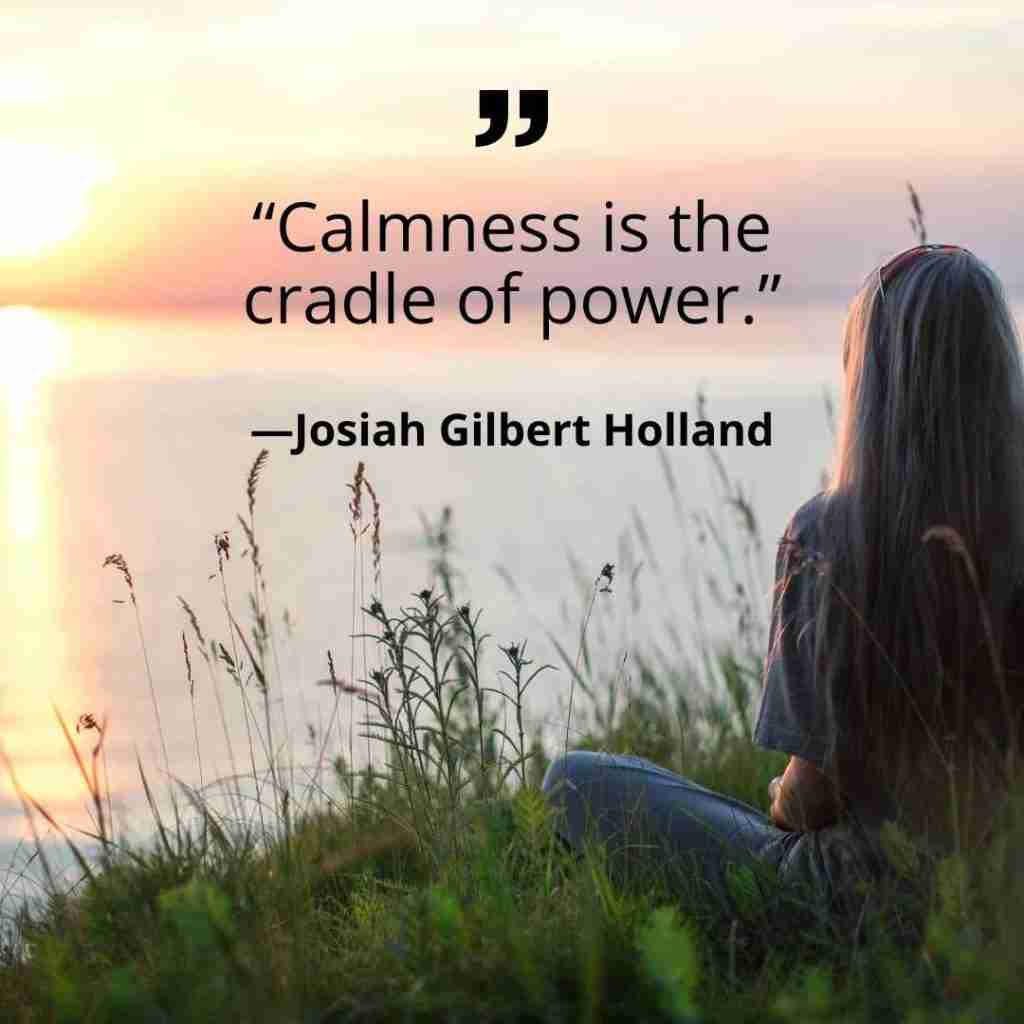Top 18 Simple Daily Tasks To Stay More Calm And Happy In Our Chaotic World
It seems as though life is always chaotic and unpredictable. We’re constantly hit with an onslaught of work, family obligations, commitments and emotions. It’s no wonder why so many of us feel overwhelmed and anxious. Wouldn’t it be nice if you could just tap a zen button for instant calmness?
The Importance Of Reducing Stress & Being More Calm
A. Improved cardiovascular health
Improving your cardiovascular health can have a positive impact on your overall well-being, including your mental health and ability to stay calm.
B. Reduced inflammation
Reducing inflammation can indeed have a calming effect on the body. Inflammation is the body’s natural response to injury or infection, but when it becomes chronic, it can lead to a variety of health problems, including increased stress and anxiety.
C. Improved mental health
Being calm and less stressed can have significant benefits for our mental health. When we experience stress, our body produces hormones such as cortisol and adrenaline, which can have negative effects on our brain and mental well-being.
D. Increased Resilience
When we experience less stress and anxiety, it can increase our resilience and ability to cope with challenging situations. Here are some ways in which having less stress and anxiety can increase resilience:
-
When we experience chronic stress and anxiety, it can be difficult to develop effective coping skills. By reducing stress and anxiety, we can focus on building coping skills that help us better manage difficult situations and promote resilience.
-
When we feel overwhelmed by stress and anxiety, it can be challenging to feel confident in our abilities to overcome obstacles. By reducing stress and anxiety, we can increase our self-efficacy and belief in our ability to overcome challenges, which can promote greater resilience.
-
When we experience chronic stress and anxiety, it can be challenging to regulate our emotions and respond appropriately to stressful situations. By reducing stress and anxiety, we can develop better emotional regulation skills, which can help us cope with challenging situations and promote resilience.
-
When we are stressed and anxious, it can be challenging to think clearly and come up with effective solutions to problems. By reducing stress and anxiety, we can enhance our problem-solving abilities and develop more effective strategies for overcoming obstacles and promoting resilience.

15 Daily Tasks To Help You Stay Calm In A Chaotic World
1. Release Tension
There are many ways to release tension and stay calm, here are some techniques that you can try:
- Progressive Muscle Relaxation: This involves tensing and relaxing different muscle groups in the body to release tension. Start by tensing your toes for a few seconds, then releasing the tension and allowing your toes to relax. Move up your body, tensing and relaxing each muscle group as you go.
- Stretching: Stretching can help relieve muscle tension and promote relaxation. Focus on stretching areas of the body that feel tight or tense, such as the neck, shoulders, and back.
- Yoga: Yoga combines stretching with deep breathing and meditation, making it an effective way to release tension and stay calm.
- Massage: Massaging tense areas of the body can help release tension and promote relaxation. You can try self-massage using a foam roller or massage ball, or book a professional massage.
- Breathing exercises: Deep breathing exercises, such as diaphragmatic breathing or box breathing, can help you release tension and stay calm by activating the body’s relaxation response.
- Mindfulness meditation: Practicing mindfulness meditation can help you release tension and stay calm by allowing you to observe your thoughts and emotions without judgment or distraction.
Remember, finding what works best for you may take some experimentation, but incorporating stress-reducing techniques into your daily routine can have significant benefits for your mental and physical health.
2. Take A Break!
Taking a break can be an effective way to stay calm and reduce stress for a few reasons:
- When we are constantly working or engaging in stressful activities, our brains can become overwhelmed, leading to feelings of stress and anxiety. Taking a break can give your brain time to rest and reset, reducing feelings of overwhelm and allowing you to approach the task at hand with more clarity.
- By taking a break, you can increase your focus and concentration when you return to the task at hand. This is because when we are fatigued or stressed, our ability to focus and concentrate can be impaired. Taking a break can help improve your cognitive function and increase your ability to focus.
- Taking a break can also promote relaxation, which can help reduce stress and promote feelings of calmness. Engaging in activities such as deep breathing, stretching, or mindfulness meditation during your break can help you relax and recharge.
- Taking a break can also encourage creativity and problem-solving. When we take a break, we allow our brains to make new connections and generate new ideas, which can be helpful when facing a challenging problem or situation.
Remember, finding what works best for you may take some experimentation, but incorporating stress-reducing techniques into your daily routine can have significant benefits for your mental and physical health.
3. Practice Mindfulness
judgment or distraction. Practicing mindfulness can help keep you calm because it encourages a sense of relaxation, acceptance, and non-reactivity to stress and anxiety.
When you are mindful, you are better able to recognize and observe your thoughts, feelings, and sensations without getting caught up in them. This can help reduce the intensity and frequency of negative emotions and prevent them from spiraling out of control.
Mindfulness can also help you develop a greater sense of control over your thoughts and emotions. By becoming more aware of your thoughts and feelings, you can learn to recognize patterns of negative thinking and shift your focus to more positive and productive thoughts.
Additionally, mindfulness has been shown to reduce activity in the amygdala, the part of the brain that is responsible for the body’s stress response. By reducing activity in the amygdala, mindfulness can help lower levels of stress hormones, such as cortisol, and promote a sense of calm and relaxation.

4. Positive Self Talk Creates Calmness
Positive self-talk is a technique that involves consciously changing your inner dialogue to focus on positive and supportive thoughts rather than negative and self-critical ones. When used consistently, positive self-talk can have a significant impact on your mental and emotional well-being, including reducing stress and increasing feelings of calm.

5. Stay Calm And Breathe Deeply
Taking deep breaths is a simple and effective way to reduce stress and stay calm because it activates the parasympathetic nervous system, which is responsible for the body’s “rest and digest” response. This response helps to counteract the effects of the sympathetic nervous system, which is responsible for the body’s “fight or flight” response to stress.
When you take deep breaths, you inhale more oxygen and release more carbon dioxide, which can help to slow down your heart rate and lower your blood pressure. This in turn signals to your brain and body that it is safe to relax and let go of tension and anxiety.
Deep breathing can also help to regulate the levels of cortisol, a stress hormone, in the body. High levels of cortisol have been linked to a range of negative health effects, such as increased inflammation, impaired immune function, and decreased cognitive performance. By reducing cortisol levels through deep breathing, you can help to protect your body from the negative effects of chronic stress.
6. Set Boundaries For Your Inner Calm
Setting boundaries is important to staying calm because it helps you establish and maintain a sense of control over your own life. When you set boundaries, you communicate your needs and expectations to others, which helps prevent misunderstandings and conflicts that can lead to stress and anxiety.
Setting boundaries can also help you prioritize your own well-being and prevent others from taking advantage of your time and energy. When you know your limits and communicate them clearly, you can avoid overcommitting yourself or taking on responsibilities that aren’t yours to bear.
Additionally, setting boundaries can help you develop a greater sense of self-respect and self-worth. When you prioritize your own needs and communicate them effectively, you are sending a message to yourself and others that your time and energy are valuable and worthy of respect.
Overall, setting boundaries is essential to staying calm and maintaining a healthy sense of balance in your life. It can help reduce stress and anxiety, improve relationships, and promote a greater sense of well-being and self-esteem.
7. Unplug And Calm Down
Unplugging, or taking a break from technology and the constant stream of information, can have several benefits for our mental and emotional wellbeing, including promoting calmness. Here are some reasons why unplugging can calm you down:
-
Reduces Overstimulation: Technology and the constant flow of information can be overwhelming and overstimulating for our brains, leading to feelings of stress and anxiety. Unplugging can give our brains a break from this overstimulation, which can promote feelings of calmness and relaxation.
-
Promotes Mindfulness: When we unplug, we are forced to be more present in the moment and engage in more mindful activities, such as reading a book or going for a walk. This can promote a sense of calmness and reduce feelings of stress and anxiety.
-
Reduces Distractions: Technology and social media can be a major source of distractions, which can make it difficult to focus and can lead to feelings of stress and overwhelm. Unplugging can reduce these distractions and allow us to focus on the present moment and what’s truly important.
-
Promotes Sleep: The blue light emitted from screens can disrupt our sleep patterns, leading to feelings of fatigue and irritability. Unplugging before bed can promote better sleep and help us feel more rested and calm.
Overall, unplugging can have several benefits for our mental and emotional wellbeing, including promoting calmness. It can reduce overstimulation, promote mindfulness, reduce distractions, and promote better sleep. By taking regular breaks from technology and unplugging, we can cultivate a more calm and peaceful state of mind.
8. Seek Support
- Sharing your struggles with someone who understands and validates your feelings can provide a sense of relief and comfort. This can help reduce the feelings of isolation and loneliness that often accompany anxiety.
- A mental health professional or a trusted friend or family member can provide you with coping skills and strategies to manage your anxiety. They can teach you relaxation techniques, mindfulness exercises, and cognitive-behavioral techniques that can help you reduce the intensity and frequency of your anxious thoughts.
- Seeking support can provide you with a fresh perspective on your situation. A trusted friend or therapist can help you identify patterns of thinking that may be contributing to your anxiety and help you reframe your thoughts in a more helpful way.
- Seeking support can help you gain access to resources and information that can help you better understand and manage your anxiety. This may include support groups, online resources, or information about medication or therapy.

9. Pray And Meditate
- Focus on a Higher Power: Prayer allows individuals to connect with a higher power or deity, which can provide a sense of comfort and support during challenging times. This can help people feel less alone and more grounded.
- Find Perspective: Prayer can provide individuals with a broader perspective on their problems and challenges. By surrendering their worries to a higher power, individuals can feel a sense of relief and release from the burden of their stress.
- Develop Gratitude: Prayer can also help individuals develop gratitude and appreciation for the good things in their lives. Focusing on positive aspects of life can help shift attention away from stressors and promote feelings of calm and contentment.
- Connect with Community: Prayer can be a communal experience, providing individuals with a sense of support and belonging. This can be particularly helpful during times of stress or crisis.

10. Exercise- Get Moving
When you exercise and move your body, it helps keeps your body balanced and calm in the following ways:
- Releases Endorphins: Exercise releases endorphins, which are natural chemicals in the brain that promote feelings of pleasure and well-being. This can help counteract the effects of stress and promote relaxation.
- Reduces Cortisol: Exercise can help reduce levels of cortisol, a stress hormone that is released during times of stress. Lowering cortisol levels can help reduce feelings of anxiety and tension.
- Promotes Better Sleep: Regular exercise can help promote better sleep, which can reduce stress levels and improve mood. A good night’s sleep can also help individuals feel more alert and energized during the day.
- Provides a Sense of Accomplishment: Engaging in physical activity can provide individuals with a sense of accomplishment and mastery, which can help boost self-esteem and promote feelings of calm.
- Offers a Distraction: Exercise can provide a healthy distraction from stressors, allowing individuals to shift their focus away from worries and negative thoughts.

11. Sleep As Much As Possible For Less Stress
Here is why it’s so important to get more rest:
- Regulates Emotions: Sleep helps regulate emotions and mood by allowing the brain to process and integrate emotional experiences. Getting enough sleep can help individuals feel more emotionally stable and less reactive to stressors.
- Reduces Cortisol: Sleep can help lower levels of cortisol, a stress hormone that is released during times of stress. Lowering cortisol levels can help reduce feelings of anxiety and tension.
- Improves Cognitive Function: Getting enough sleep can help improve cognitive function, including memory, attention, and decision-making. This can help individuals better manage stress and make more effective choices.
- Enhances Physical Health: Sleep is essential for physical health and well-being, including immune system function and cardiovascular health. A healthy body can better manage stress and promote feelings of calm.
- Provides a Reset: Sleep provides a reset for the body and mind, allowing individuals to start each day with a fresh perspective and renewed energy. This can help individuals better manage stress and approach challenges with a more positive outlook.

12. Visualize A Calm Scene
Visualizing a calm space can be a helpful tool to promote feelings of calmness and relaxation. Create a mindful home and a calm space to spend time in. When you visualize a calm scene when you close your eyes it helps put you in a different space and time.
13. Listen To Music
Listening to music can have a calming effect on the mind and body, and there are several reasons why:
- Releases Endorphins: Listening to music can release endorphins, which are chemicals in the brain that promote feelings of pleasure and reduce feelings of stress and anxiety.
- Regulates Breathing and Heart Rate: Music can have a physical impact on the body by regulating breathing and heart rate. Slow, calming music can help slow down breathing and heart rate, promoting feelings of relaxation and calmness.
- Distracts from Stressful Thoughts: Music can serve as a distraction from stressful thoughts and worries. By focusing on the melody and lyrics of a song, individuals can shift their attention away from stressors and promote a sense of calmness.
- Promotes Mindfulness: Music can also promote mindfulness, the practice of being present and aware in the moment. By focusing on the sounds and sensations of the music, individuals can tune in to the present moment and reduce feelings of stress and anxiety.
- Provides Emotional Connection: Music can provide an emotional connection that promotes feelings of comfort and relaxation. Listening to music that resonates with your emotions can promote a sense of validation and understanding, reducing feelings of stress and promoting overall well-being.
Overall, listening to music can be a powerful tool for promoting feelings of calmness and relaxation. By incorporating music into your daily routine, you can reduce stress levels and improve your overall well-being.

14. Soothe Your Senses With A Hot Bath.
The sound of the water, the feeling of warmth on your skin, and the aroma of bath products can all help create a relaxing environment. I love taking a hot bath… It’s so relaxing and I always feel less stressed and more calm after.
Taking a bath can provide a quiet, private space for you to be alone with your thoughts. This can be an opportunity to reflect, meditate, or simply disconnect from the stressors of daily life.
Overall, taking a bath can be a restorative and calming experience for both your mind and body.
15. Change Your Mindset And Perspective
Our mindset and perspective can greatly impact our emotional state, and changing them can help us to feel more calm and centered.
Here are some ways that changing your mindset and perspective can help to calm you:
-
Focusing on the positive aspects of a situation, rather than the negative, can help to reduce stress and promote feelings of calmness. By reframing our thoughts in a more positive light, we can shift our perspective and reduce the impact of stressors on our emotional state.
-
Accepting a situation, rather than fighting against it, can help to reduce feelings of stress and anxiety. By recognizing that we cannot always control external circumstances, and that it’s okay to experience negative emotions, we can reduce the intensity of those emotions and feel more calm.
-
Focusing on what we have to be grateful for, rather than what we lack, can help to shift our mindset to a more positive state. Gratitude practices, such as keeping a gratitude journal or taking time to reflect on what we are thankful for, can promote feelings of calmness and reduce stress.
-
Sometimes, changing our perspective on a situation can help us to feel more calm and in control. For example, looking at a challenge as an opportunity for growth, rather than a setback, can help to reduce feelings of stress and promote resilience.
“The next time you are tempted to get anxious or upset about something – especially something in the past or the future – think about what you are doing and turn your mind to what is going on today.”
―Joyce Meyers
16. Eat The Right Foods That Impact Your Mood
The foods you eat can have an impact on your mood and overall sense of calmness. Here are some types of foods that may help promote relaxation:
- Complex carbohydrates: Foods like whole-grain bread, oatmeal, and brown rice can increase the production of serotonin, a neurotransmitter that can help regulate mood and reduce anxiety.
- Omega-3 fatty acids: Found in fatty fish like salmon, as well as walnuts and chia seeds, omega-3s can help reduce inflammation in the body, which may be linked to anxiety and depression.
- Magnesium-rich foods: Magnesium is a mineral that can help promote relaxation and reduce stress. Foods like spinach, almonds, and avocado are good sources of magnesium.
- Herbal teas: Chamomile, lavender, and lemon balm teas are all known for their calming properties and can help promote relaxation and reduce stress.
- Fermented foods: Fermented foods like kimchi, kefir, and sauerkraut contain probiotics that can help improve gut health, which has been linked to improved mood and reduced anxiety.
It’s important to note that while these foods may help promote relaxation and reduce stress, they are not a substitute for professional help or treatment if you are experiencing anxiety or other mental health concerns.

17. Keep A Journal to Relieve Stress
Keeping a journal can help relieve stress by putting you into a meditative state of self-reflection. Especially if it’s a gratitude journal! Writing about the things you’re grateful for, in particular, can help you reorient your perspective. There is a growing body of research that suggests that writing in a journal can have a positive impact on mental health and help alleviate stress.
Research Based Reasons To Journal:
- Reduces Stress: Several studies have found that expressive writing, or writing about one’s thoughts and feelings, can reduce symptoms of stress and anxiety. One study found that participants who wrote about their stressful experiences had reduced cortisol levels, a hormone associated with stress, compared to those who did not write.
- Promotes Emotional Processing: Writing in a journal can also help individuals process and make sense of their emotions. By putting thoughts and feelings into words, individuals can gain clarity and insight into their experiences, reducing feelings of confusion and overwhelm.
- Improves Mood: Expressive writing can also improve mood and increase feelings of well-being. One study found that participants who wrote about positive experiences had improved mood and reduced symptoms of depression.
- Enhances Cognitive Functioning: Writing in a journal can also enhance cognitive functioning, such as memory and problem-solving abilities. One study found that expressive writing improved working memory and cognitive flexibility.
- Boosts Immune System: Writing in a journal can also have physical benefits, such as boosting the immune system. One study found that participants who wrote about their traumatic experiences had improved immune function compared to those who did not write.
Overall, the research suggests that writing in a journal can have numerous benefits for mental and physical health, including reducing stress, improving mood, and enhancing cognitive functioning. By incorporating journaling into your daily routine, you may be able to reap these benefits and improve your overall well-being.

18. Spend Time With Your Close Friends & Family
When was the last time you went out with friends or family and laughed so hard your tummy hurt? Laughter is a stress reliever. When you laugh and enjoy times with girlfriends, it’s good for your health. Seriously!
Why? Spending time with friends can provide a sense of social support and reduce feelings of loneliness or isolation.This can help improve your overall well-being and reduce stress levels.Spending time with friends can also lead to laughter and positive emotions, which have been shown to have a range of health benefits, such as boosting the immune system and reducing inflammation.
Being able to communicate openly with friends and share your thoughts and feelings can help reduce stress and provide a sense of emotional support.Friends can provide a different perspective on life’s challenges, which can help you gain new insights and feel more empowered to face difficulties. Spending time with girlfriends can provide a range of health benefits and help you stay calm by providing social support, fostering positive emotions, engaging in shared activities, enabling open communication, and providing a new perspective on life’s challenges.







